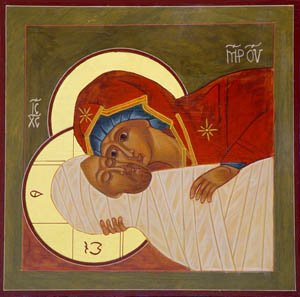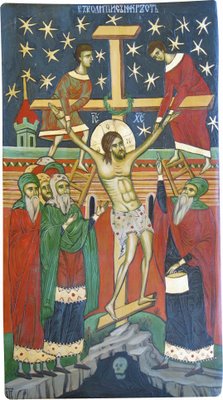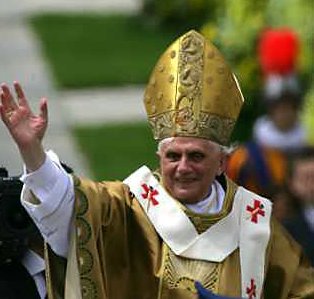During our childhood (and if not our childhoods, exactly, certainly during the childhoods of our parents) Catholics were encouraged to develop a strong personal piety centered on a deep personal sorrow for the suffering of Jesus, who died for me, instead of me.
We were encouraged to gaze on the crucified Saviour and contemplate our sins: We were supposed to discover in our pilfering, our lies, our fights with siblings, our sass the very nails that pierced the living flesh of Jesus and fixed him to the cross. Cheating, ditching Biology, masturbation, gossip, infidelity, smoking and other later sins are the same nails just writ large, thorns in Jesus' crown, or the wound in his side.
Jesus, the Cosmic Innocent, is nailed to the Cross by my sins, and because of my sins, he hangs there, suffering, dying in my place for MY redemption. Of course, while Jesus is busy doing all this for me, he is also doing this for thousands of other little Catholic boys and girls, men and women. [Can we include here, Hindus, Southern Baptists?]
I have come to be profoundly disturbed by [if not also free of] this piety.
Sin did kill Jesus. And I readily admit that my sins, my participation in the sin-of-the-world, are totally implicated in Jesus' death. But I answer that the crucifixion is not meant to reveal what MY sins have done to poor Jesus.
My sins are part of the sin-of-the-world. My sins. Your sins. Everyone's sin. This seductive matrix of deceit, fear, ignorance which ensnares us all killed Jesus and it kills you and me. It implicates all of us in everything.
The icon of the crucifixion, and the crucifixion itself, reveals what sin, your sin, my sin, all sin does to human beings and to the world around us. Sin is utterly and subtly corrosive. It disfigures. It pierces our flesh and scars us. It truncates us, pins us down. It destroys us. Jesus, the Son of Man, was scourged, humiliated, nailed to the cross by this sin, not so much to pay a debt--though I do not deny that may be somehow involved, but in order to reveal to us clearly just what sin is, and just what sin can do to us, even when it is not MY sin -- though it is always my sin to some extent.
The Passion of the Saviour reveals what hate can do, what fear, what loathing, what ignorance can do. . .
As a child, when confronted with images of lynchings, or of WWII atrocities, or of then contempoary images of Indochina I always immediately thought, "Jesus hung on the cross so that this shit wouldn't have to happen any more."
These things do not have to happen anymore. Jesus, a true hero and lover of mankind, has shown us the real horror of sin. A renewed, adult contemplation on the suffering of Christ might invite us to engage the hate and fear in our own hearts and to reject them, to root them out. The Passion of Christ can encourage us to ask God for healing for ourselves and our neighbors and to ask God for rescue.
Our sin, all sin, will kill you and me, just like it killed Jesus.
The death of Jesus is not the end of the story that the Church tells.
Jesus dies, he is buried in a borrowed tomb, he is raised up on the third day.
Jesus, God's son, was destroyed by sin. Jesus does not seem to die, Jesus dies -- dead as dead can be. Jesus, God's son, is raised from the dead to a renewed life, a life free from sin and death. Even Jesus dies, a victim of sin, even if it is NOT his sin.
God does not allow sin to be victorious over his son or over any part of creation.
Paul teaches in the Epistle to the Romans [which we will hear vigorously proclaimed during the Great Vigil on Saturday night]:
Brothers and sisters:
Are you unaware that we who were baptized into Christ Jesus
were baptized into his death?
We were indeed buried with him through baptism into death,
so that, just as Christ was raised from the dead
by the glory of the Father,
we too might live in newness of life.
For if we have grown into union with him through a death like his,
we shall also be united with him in the resurrection.
The piety of MY sin = the Nails in Jesus' hands and feet has always lead me to despair, so I don't often recommend it. How can anyone be sorry for every bloody thing one has ever done? How can anyone ask for that forgiveness?
The crucifixion reveals to us that God alone is the remedy for our sin, your's and mine, and the matrix of sin in which we live out our day-to-day lives. God raised Jesus from death to a life free from sin and death and God will raise us too.
It is never pointless to ask God for forgiveness. I would add that it is never too soon to ask also for rescue and to begin a life of rescue. Rejoice in the rescue that the resurrection promises.














